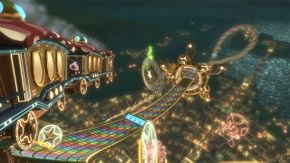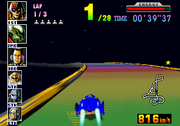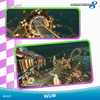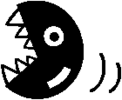N64 Rainbow Road
Template:Articleabout Template:Racecourse
Rainbow Road is the final track in Mario Kart 64 and the last course of the Special Cup. It is the longest race course in Mario Kart 64 at 2,000 meters (2 kilometres) and requiring about two minutes per lap, making it the longest three-lap track in the whole series. The track differs from the other Rainbow Roads in that it has rails throughout the track. The track features a transparent multi-colored glass path and with star-shaped rails running throughout the entire course. Neon-light pictures of the eight playable characters, plus a portrait of a Boo and a Mushroom in the distance, float in the void. Moreover, a big three-dimensional smiling star lies in a curved section of the track. Roving Chomps slide through the course in a zig-zag pattern, and colliding with them will cause the player's kart to crash and thrown into the air. The course returns in Mario Kart 8 as a heavily-revamped retro course in the Lightning Cup and the final course overall of the entire game. (excluding DLC).
Course layout
Template:Right The course starts with a huge drop followed by a gentle uphill stretch, passing through a rainbow ring. After the ring, there is a wide loop with neon signs of Mario, Peach and Luigi on the loop's outside. Following the loop is a steady downward road that crosses over the steep drop where a Mushroom sign can be seen. After the bridge is a corkscrew loop with a large star in the center and a Boo sign at the corkscrew's outside. Racers turn around a corkscrew to reach a hairpin bend, where signs of Donkey Kong and Yoshi are seen. Shortly after the hairpin bend is a short straightaway followed by a smaller drop and small uphill stretch. A Toad constellation can be seen after the drop as well as a wide right hand turn. A straightaway follows with a Wario sign present, then follows a final looping section, where a Bowser sign is seen. After the loop is a final straightaway to the finish.
Although this track may easily be both the easiest and longest Rainbow Road track due to the railings and length, racers can perform a large shortcut by making a timed hop to the left (or right, during Extra) during the drop at the beginning.
Mario Kart 8
This version of Rainbow Road returns in Mario Kart 8, where it is the final course in the Lightning Cup, similar to SNES Rainbow Road's reappearance in Mario Kart 7 (which also returns in Mario Kart 8 as a DLC course). Compared to other retro courses in this game, it has massive amount of changes compared to the original version, to the point that it looks more like a Nitro course than just a remade Retro course.
The most notable change is the setting; just like GCN Rainbow Road, this one takes place above a brightly lit city near a coast at night instead of the deep space from the original. The city is much more realistic and active than the GCN version, with cars moving everywhere. Also, there is a moon in the sky that can be seen right after the starting line.
The road is now formed by multi-colored tiles made of glowing LED lights, (similar to SNES Rainbow Road), laid out in diagonal color pattern within a golden frame, as opposed to the slightly transparent glass stripes from the original version, while the starting line has a bronze diamond mosaic pattern with glowing star rings surrounding the rotating banner.
The starting banner is now a rotating, star-shaped planetary gear; once players nearly reach the finish line, the outer gears will change shape by expanding their star-shaped appendages wide and closing in upon themselves.
There are now some nods to Super Mario Galaxy, such as the large star in the circular loop that appears in the original being replaced with a Grand Star and the star rails designed after Launch Stars. Also, most of the rails have been removed, adding to the challenge. Another visual feature is a flying train that passes around the course (that's based on an 0-4-0ST Porter Saddle Tank), ridden by Toads who throw coins at certain areas. There are now fireworks around the course, with some that form the six playable characters that have been present since Super Mario Kart (Mario, Princess Peach, Luigi, Yoshi, Toad, and Bowser). These replace the neon-lit signs of the eight playable characters in Mario Kart 64 (the aforementioned six, Wario and Donkey Kong), and a portrait of a Boo and a Mushroom from the original. Some of these fireworks take their appearance from stamps in Super Mario 3D World, though Yoshi's firework is based on his artwork from Yoshi Topsy-Turvy.
The other major change is that the course has been greatly altered to incorporate the game's hang-glider and anti-gravity mechanics. From a view above the course, the circular loop, in the middle of which sits the Grand Star, lies on the left side of the course instead of on the right side and is inclined at near-90 degree angle to act as an anti-gravity section. At the gentle uphill stretch, which succeeds the steep slope, the rainbow-colored rings are now an anti-gravity panel. The dip after the large U-Turn is now another smaller U-turn. The Chomps are now larger, and instead of sliding through the course in a zig-zag pattern, they bounce repeatedly, creating waves on the track that can be used to perform aerial tricks. As the Chomps land, the section they create a wave on will flash. Along the course, Boost Pads have been added and come in the form of small Launch Star-shaped rings that spin every time a racer passes through, as well as Boost Rings that can be reached with glider ramps. The final stretch before the finish line is now slightly sloped as an anti-gravity section and ends with a glider ramp.
In addition, similar to Rainbow Road from Mario Kart 7, the course is run as a single lap divided into three sections, instead of three laps, and the last part before the finish line has also been slightly shortened, in order to cut down the length of the original. On the third section, the chorus of the music now starts to play, instead of the beginning of the music. It is the first and only retro course to do this. The remixed music of the course is also the most orchestrated compared to other retro courses, with an entirely different arrangement.
In a minor note, a map of the city beneath the course, mentioning Toad Harbor, Moo Moo Meadows, and Wario's Gold Mine, can be seen in Super Bell Subway. Thus, this Rainbow Road is likely set above those courses.[1] Many of the companies whose advertising signs can be seen in the various tracks have their headquarters in this city.[1] The railway lines that can be seen from this Rainbow Road, according to the map in Super Bell Subway, connect this city to many other places where tracks of Mario Kart 8 can be found.[2]
F-Zero X
F-Zero X features the N64 Rainbow Road as Rainbow Road: Psychedelic Experience. It is the first course of the Joker Cup (the game's equivalent to the Special Cup). Parts, though not all of it, are rainbow-colored. Unlike the original, it has no barriers in certain areas, and the neon Mario franchise decor is missing. Instead, it just has a plain black background with a watery blue bottom to which careless drivers may fall. In addition, when racing the track with the 64DD expansion features, the background song is a rock version of the Rainbow Road song heard in Mario Kart 64. There aren't any Chomps, but there are deadly minefields on certain sections of the track which could cause drivers to crash or destroy their vehicle.
Official descriptions
Mario Kart 64 Instruction manual description: This course can be described in a word -- LONG, very long. It is simply the longest of all the courses. As the name indicates, the road is made of rainbow and it has a fantastic view of neon sculptures twinkling in the distance. The final course of the Special Cup, it is definitely worth seeing. It is advisable to slow down to avoid the Chomps that will attack.
Gallery
N64 appearance
- RainbowRoadMK64.png
The icon from the menu.
Wii U appearance
- MK8- N64 Rainbow Road.PNG
The track's icon.
Approaching the Grand Star in the middle of a loop.
The stamp obtained for beating the staff ghost at this course.
Names in other languages
Trivia
- In Mario Kart 64, the neon lights of Mario, the Mushroom, and Boo are the only ones that are animated.
- Rainbow Road is one of only two non-SNES courses in the series that differ in lap count between its original and remade versions; the other is GCN Baby Park in Mario Kart DS.
- These courses are both the longest and the shortest courses in the series.
- In Mario Kart 8, this course, Rainbow Road, and the downloadables SNES Rainbow Road and GCN Baby Park are the only courses in the game to have the map in different colors instead of just blue.
- The map of its reappearance in Mario Kart 8, shown in the Prima guide, has two Boost Pads on the third section placed on the right side. However in the game, they are actually placed on the left side.
- In Mario Kart 8, the placement of the first two boost pads on the steep slope and the first two launch stars varies every time the player enters the race on this course.
- There is a possible reference between the flying train in the new version and the music in the original. The train might reference the fact that the first part of the music in the original version uses a synthesized instrument (computer generated) that sounds like a train whistle, more specifically, a pan pipe.
- In Mario Kart 8, in the center of the city below, there is a tower that faintly resembles the Eiffel Tower, with four ? Blocks, a Mushroom, and a spinning Star visible on top of it.
- The new version contains apparent references to Rainbow Roads of previous games, with the exception of Mario Kart: Super Circuit.
- The course itself is a remade version from Mario Kart 64, the square tiles from Super Mario Kart, the city setting is from Mario Kart: Double Dash!!, the star-shaped rails and the loop section from Mario Kart DS, the Launch Stars from Mario Kart Wii, and the single lap race with three sections from Mario Kart 7.
References
Template:BoxTop Template:Racecourses














